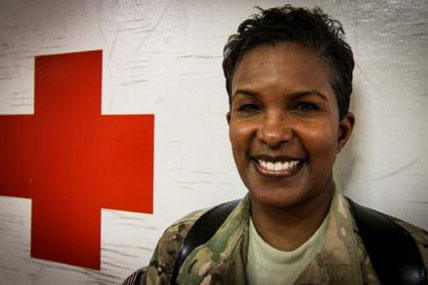KANDAHAR AIRFIELD, Afghanistan – Lt. Col. Melisa Gantt has a job most people, whether they are in the Army or not, don’t know about.
Behind the scenes, out of sight, out of mind.
Just the way she likes it.
As the deputy director of the Joint Combat Casualty Research Team (JC2RT), based out of Kandahar Airfield, Afghanistan, Gantt spends most of her days poring over pages of data and research of battle-related injuries with one goal in mind – win the war.
“I heard a quote once, ‘the only winner in war is medicine’ and I believe that is true,” Gantt said. “As wars have progressed, so has medicine, and we (JC2RT) are a major part of that.”
The goal of the JC2RT, who reports directly to U.S. Central Command, is to get insight from medical professionals within the armed services, and the service members who provide that medical care, to see how casualty care can be improved or better sustained.
The JC2RT has been researching casualty care in Afghanistan since its inception in 2006, and while Gantt spends her days at Role 3 NATO Multi-National Medical Unit at Kandahar Airfield, the team is spread at hospitals throughout Afghanistan, with teams at Camp Bastion and Bagram Air Field as well.
While they do the main research, it is the feedback they get from doctors and other medical personnel that is the key, Gant, who in addition to research serves as an ad hoc member of the trauma team at Role 3 as a qualified nurse, said:
“Doctors, nurses, and the medics – they all give us feedback, and help us create those ‘lessons learned,’ so that we can make suggestions and help them by providing them with better tools and equipment,” she added. “We arm our medics with the best resources available because they are the ones out there providing casualty care, and they too need to be taken care of.”
Teams like the JC2RT have been in use over the course of Army history, with medical care and ways to properly treat casualties evolving over time.
Gantt talked about the recent evolutions, most notably between the wars in Iraq and Afghanistan.
“A big thing was the development of the self-applied tourniquet,” she said. “Someone came back from the field and realized that the tourniquet is best and most effective when self-applied,” she said. “So teams did the research, compiled the data and now it is the standard used tourniquet.”
Even though she and the rest of the JC2RT work within the medical field, an area where pass or fail can sometimes mean life or death, the research they do requires patience, as Gantt says “we do not see the results right away.”
Is it worth it?
“Absolutely, we have one of the most rewarding jobs,” she said. “A lot of time and effort goes into our research, but we really have been able to make a difference, and continue to do so.”
Not only does the research of Gantt and the JC2RT help advance medicine within the military, but research they publish can, and has been used in the civilian sector as well.
“Research today is better medicine tomorrow,” she said. “And that is what we do.”
Out of sight, out of mind – but making the biggest difference, one idea at a time.




























